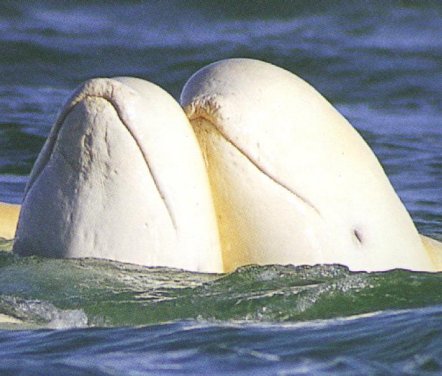

Saying that overhunting is the problem and measures are already in place to protect Cook Inlet's declining population of beluga whales, the National Marine Fisheries Service announced Thursday it would not list the whales as endangered.
Development interests applauded the agency for not "unnecessarily restricting development." Environmentalists, however, said they will sue because they think the whale's current listing as depleted under the Marine Mammal Protection Act does not go far enough.
Kris Balliet, director of the Center for Marine Conservation, agrees that hunting caused the decline but said other factors, such as oil and gas development and municipal wastewater, may be harming the whales. Balliet said she wants habitat important to the whales given special protection, which cannot be done under the Marine Mammal Protection Act.
"We're taking NMFS to court," Balliet said Thursday. "It's gotten to such a critical stage that only the Endangered Species Act would put the necessary restrictions in place."
From 1994 to 1998, the beluga population was cut in half, from 653 whales to
347. The number of whales hunted is not precisely known, but hunters took 78
belugas in 1998, according to federal estimates.
NMFS, in a federal rule published Thursday, said whale hunting is already being controlled. Currently, the taking of a beluga is banned under a law passed by Congress unless an exception is made through a cooperative agreement with Native groups. NMFS gained the power to regulate hunting since the whales were listed as "depleted" last month.
No Cook Inlet belugas were legally harvested last year. This summer just one
will be taken under a co-management agreement recently signed by NMFS and the Cook Inlet Marine Mammal Council, a group of local tribal governments.
The whale will be hunted by the Native community of Tyonek, which has the longest tradition of hunting Cook Inlet belugas, according to Dan Alex, project coordinator for the marine council. The hunt will take place in July
to reduce the chance of killing a pregnant female or a whale calf, said Brad
Smith, a NMFS biologist.
In the rule released Thursday, NMFS officials said factors besides hunting, such as oil and gas leasing or pollution, do not appear to be causing the whale's decline. Tissue samples taken from 80 whales show that Cook Inlet belugas contain lower levels of contaminants than other beluga populations found in Western Alaska and in the Arctic, Smith said.
"These appear to be very healthy animals," he said.
Besides oil and gas exploration and drilling, one culprit suspected by Balliet is Anchorage's wastewater treatment plant, which does lower-level treatment than other plants throughout the country. Brian Crewdson, spokesman for Anchorage Water and Wastewater Utility, said testing on fish shows that the plant is not causing excess sedimentation in the Inlet or a buildup of toxins. He said that the Inlet's tidal fluctuations and currents flush out the area and that Anchorage has very little industry contributing contaminants to the waste stream.
NMFS also said recent surveys indicate the beluga population could be increasing. Last year, the agency estimated a population of 357 whales compared with 347 in 1998. At least three more years of data are needed, however, to determine if the population is growing, NMFS said.
Meanwhile, the agency is conducting regular overflights of Cook Inlet to look for people illegally hunting or harassing belugas. Special Agent Kevin Heck said NMFS is investigating two cases of possible illegal hunting, but would not provide details.

On 5-31-00, the National Marine Fisheries Service officially designated the Cook Inlet beluga whale as a "depleted species" under the Marine Mammal Protection Act. The designation comes in response to a petition by the Center for Biological Diversity and others to list the whale as an endangered species in March, 1999. The "depleted" designation will likely lead to the eventual banning of all hunting for the declining species.
The Cook Inlet beluga whale has declined from over 1,000 individuals to about 350 in recent years. It is threatened by oil development, commercial fishing, and discharge of urban and industrial wastes. The Fisheries Service has issued an initial positive finding on the listing petition, but has stalled in formally proposing the whale for listing. In order to break the political gridlock, the Center and others sued on 5-8-00, demanding that the Service rule on the petition before the beluga declines even farther.